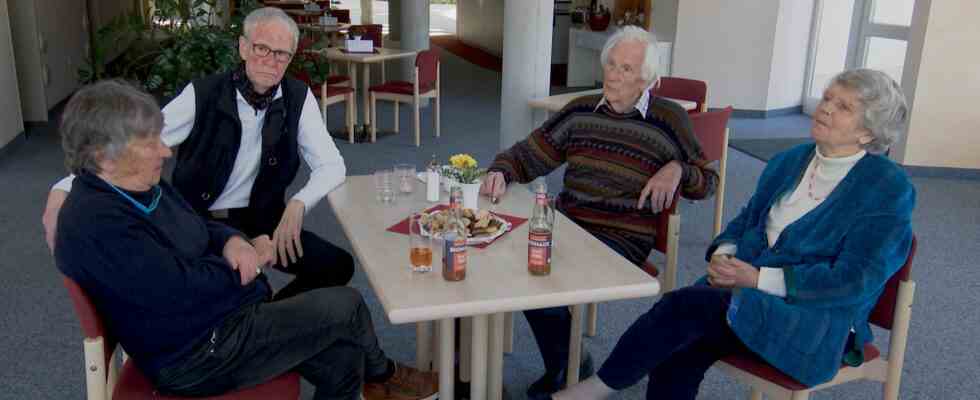Status: 03/12/2022 12:48 p.m
Images of the war in Ukraine evoke painful memories in older people – fears, worries. The young generation, who until now have not known any war in Europe, is confronted with a new feeling.
Christian Hoppe grew up in Dessau. In March 1945 he witnessed the destruction of the city. He was just a kid then. “The most dramatic thing was the bombing. So it started with the sirens,” says the 86-year-old. “We all still have that in our ears.”
Hoppe is sitting at the table with other residents of the retirement home of the Nikolaus-Cusanus-Haus in Stuttgart. You talk about that time. The TV is right next to them, the news shows pictures from Ukraine. They didn’t think they would experience another war on European soil, they say. Memories are revived.
memories of the war generation
“The bombing lasted about 45 minutes,” says Hoppe. “Non-stop explosions. We walked down the street. At night, it was light because the houses were bursting with flames.” Sylvia Bardt sits next to him. When she found out about the war in Ukraine, she felt like someone was going to punch her in the stomach, says the 83-year-old. “The fright, so to speak.”
When she was six years old, she fled Poznan, in what is now Poland, with her mother and siblings. They got caught in a low-flying attack near Magdeburg. “I was wearing a white rabbit fur hat, my pride and joy. And these pilots saw that,” she says. “I noticed they were shooting around me, it was like a circle. Then it was over. The adults said: Now you can get up. And I stayed down. I couldn’t get up.”
The war – topic in the schools
The residents of the retirement home experienced the war themselves. For the younger generations in Europe, on the other hand, war has so far mostly been abstract, unimaginable. Just like for the students at the Theodor Heuglin School in Ditzingen. In class 3b there was only one topic after the carnival holidays, says teacher Esther Dörnemann. Normally the children would talk about the holiday, but this time it was different.
“I saw this and that picture in the news. Did you see that too and did you hear that too?” Dörnemann describes the reactions. With her colleagues, she talked to the children about the subject of war. They would have explained a lot and also tried to allay fears.
On this day, too, they discuss in a seated circle what is on the children’s minds. “My big question is: Why does Putin always want more?” asks a student. Her classmate says: “When I saw the war, I just didn’t want to play any more games because then I just got sad. Putin has to make peace again.”
“People have a need to talk about it”
Psychologist Susanna Hartmann-Strauss is familiar with such fears. In her practice in Calw, the war in Ukraine is now a topic in every therapy session. “People feel the need to talk about it,” she says. “There are two groups: those who have already experienced war in their lives, such as the older generation, people from the former Yugoslavia, from Syria,” says Hartmann-Strauss. For them, experiences would be activated that are normally repressed. That is no longer possible with the pictures from Ukraine.
The other group has not yet experienced a war. For them, war has always been something abstract. “Due to the geographical proximity, the war suddenly becomes concrete and the thought ‘this has nothing to do with me’ no longer works.” The psychologist advises anyone who has fears about the war to acknowledge them and express them clearly. That would already have a healing effect. It’s also important to talk to others about it. “Then I realize that my worries and fears are not crazy, that others feel the same way and that I am not alone with my thoughts.”
“Fear is part of life”
Mazda Aldi, stress researcher at the Charité in Berlin, says: “Fear is something normal and is part of our lives. The fear that weighs on us is the one that we can no longer control, from which we cannot free ourselves.” Aldi observes this powerlessness, the feeling of no longer being able to calm oneself, especially in younger people.
One reason for this: excessive news consumption. This is an attempt to regain control of the situation. “But what actually happens is that the topic is omnipresent,” says Aldi. That tends to increase the feeling of fear and threat.
Hartmann-Strauss also advises asking questions: How many news do I watch and where can I get reliable information? And she advises a clear separation: “What do the people experience there in Ukraine and what do I experience here in Germany? This is not my current living environment, but that of others. I am safe today and here.”
do something to oppose the war
Hope instead of fear – that’s the motto in the Nikolaus-Cusanus-Haus. Every evening the chapel of the retirement home is filled with prayers for peace in Ukraine. “You feel your own helplessness. And somehow you still want to do something, also in the community,” says Albrecht Strebel.
“We’re not all young anymore and don’t have brilliant voices. But when 30 people sing a canon here, that’s great, that’s strong,” says Silvia Bardt. They want to use this strength to oppose the war so that it will never be the same again.

